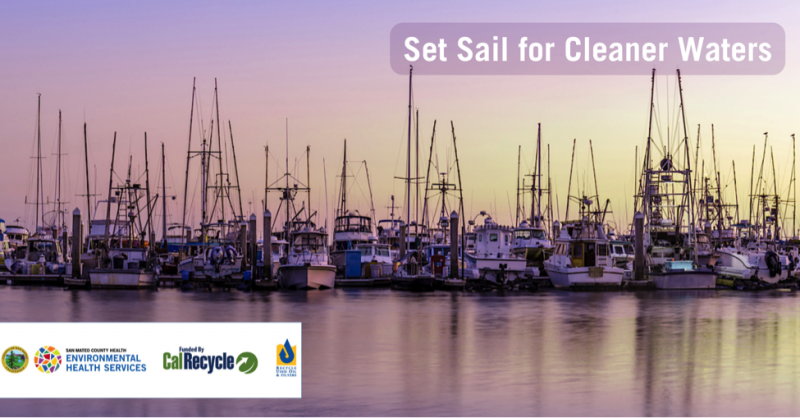
5 Eco Tips for the Ocean-Loving Boater
Boaters are drawn to the beauty and serenity of our oceans and waterways. They’re also responsible for preventing pollution and protecting our marine ecosystems, which are sensitive to hazardous waste, motor oil, and trash that may come from boats. Hazardous waste and motor oil can be harmful to marine wildlife, even in small quantities. Additionally, ocean animals may become entangled in trash or mistake plastic for food.
Luckily, there are many ways boaters can get “all aboard” with pollution prevention. Here are five eco tips for the ocean-loving boater:
- ⚠️ Safety First — Switch to Reusable Flares
- Boaters in the US are legally required to carry visual distress signals. However, expired, single-use marine flares are extremely hard to dispose of and are considered explosive hazardous waste.
- Go reusable — Stock your boat with Electronic Visual Distress Signal Devices (eVDSDs). They are safer for your family, better for the environment, never expire, and are ultimately more cost-effective.
- Save 10%! For the rest of 2022, California boaters can take advantage of this discount for a US Coast Guard-approved pyrotechnic flare replacement from Sirius Signal.
- ?️Safely Dispose of Used Oil and Oil-related Items
- Used motor oil, oil filters, and oil cleanup absorbents (e.g. bilge pads) pose a threat to the ocean and our waterways if not properly disposed of.
- If you’re a boater in San Mateo County, your marina will help you recycle or safely manage used oil, filters, and oil absorbent materials — call your harbormaster for details or click here for a marina phone directory.
- If you live elsewhere in the Bay Area, check out this San Francisco Bay Clean Boating Map for locations of marina-based pollution prevention services.
- ☢️ Properly Dispose of Hazardous Waste
- Many items you may have in your boat such as paints, varnishes, batteries, oil, oil filters, and old fuel are hazardous waste that poses a threat to humans and the marine environment.
- Too toxic to trash — Safely manage hazardous waste using retail drop-off locations or curbside pickup, or by making a FREE drop-off appointment.
- ? Go Green and Clean
Many cleaning products contain chemicals that are harmful to marine ecosystems if released directly into waterways.
- Choose less toxic cleaning products, which were tested by the BoatUS Foundation for eco-friendliness and effectiveness.
- Wash your boat on land in a designated wash area or on a permeable surface that will absorb and filter the wash water.
- ♻️ Repurpose and Recycle Old Gear
If you have unwanted boating gear that is still in good condition:
- Donate it to someone else or set up a gear exchange at your marina.
- Reel in and recycle — Fishing lines are not biodegradable and marine life may suffer from line entanglement. Find a list of line recycling container locations here.
Out with the old, in with the new — If your gear is past its useful lifetime, see if there are options to recycle it into something new. For instance, SeaBags turns old sails into reusable bags, and Suga recycles old wetsuits into new yoga mats!
These tips are brought to you by San Mateo County Environmental Health Services (EHS). EHS works to ensure a safe and healthy environment in San Mateo County through education, regulation, and monitoring. Visit smchealth.org/boatoil for more boater information and resources.


